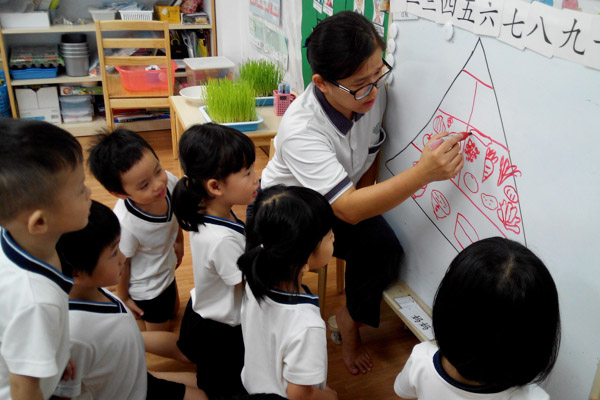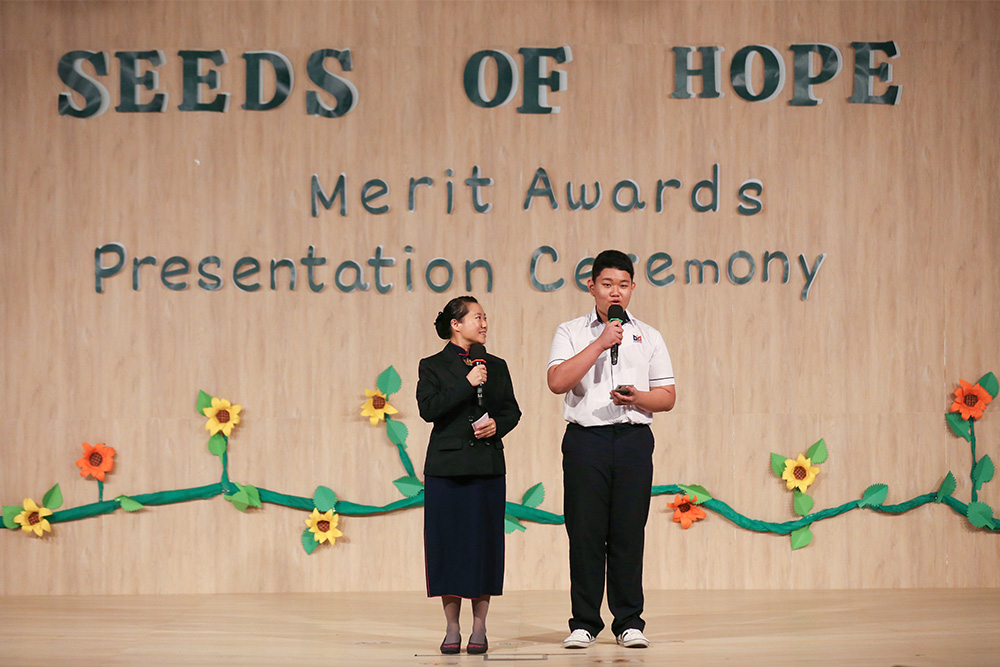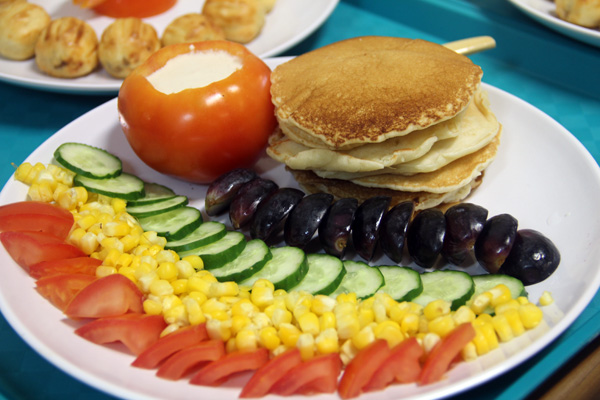 The “hand-washing challenge” inspires children to develop the right habit of washing hands.
The “hand-washing challenge” inspires children to develop the right habit of washing hands.
A group of preschoolers sat in a circle on laminated wooden floor with their legs folded, and then took out their school uniforms from their schoolbags and laid them on the floor. As the children started folding their clothes, their teachers, with assessment cards in their hands, attentively watched them in order to score them on their “performance”.
These young children, aged three to six (Class N1 to K2), were the students of Tzu Chi Great Love PreSchool. They were participating in a three-day Self-Help Skills Challenge held in February 2019, where they had fun practising and mastering independent living skills through undertaking a series of “challenges”.
Buttoning up a shirt is an easy task for adults; however, it is quite a challenging feat for a 5-year-old. The preschoolers bent their backs as their little hands worked slowly to button up their shirts, trying their best to slip each button through the right buttonhole, before folding them into half from top to bottom.
 Little children taking their uniforms out of their schoolbags to get ready for the clothes folding challenge.
Little children taking their uniforms out of their schoolbags to get ready for the clothes folding challenge.

A child carefully buttoning up his shirt.
Folding clothes, wearing and taking off shoes and socks, washing hands, etc. are little tasks that the young students at Tzu Chi Great Love PreSchool learn to do every day. Audrey Koh, the principal of the PreSchool, said that the main purpose of holding the “Self-Help Skills Challenge” was to assess and evaluate the self-help skills of the children in a fun and interesting way.
She added that although it appeared that the teachers were evaluating the learning outcomes of the children, the activity also allowed them to better understand each child’s ability to take care of themselves on a daily basis and to determine whether they needed to improve on their teaching methods.
"This activity not only evaluates the children, but also allows the teachers to assess their teaching methods. It is a two-way interactive approach,” explained Koh.
“We start with washing palm to palm,between each finger let us rub……”
Standing before the sink, Koh sang a lively hand-washing song while she observed the children as they washed their hands. Washing hands correctly to eliminate bacteria was one of the challenges set by the teachers. The preschoolers put some soap on their hands, and then carefully rubbed their palms and the back of their hands before rinsing them clean.
“We emphasize on hand hygiene as this is what children have to do every day. They need to wash their hands when they enter the school, before they have their meals, after they sneeze and after they use the washroom. So we teach them how to wash their hands right from the start,” shared Koh.
Au Foong Yee, the PreSchool’s teacher who is in charge of planning the self-help skills curriculum, believes that personal hygiene awareness should be taught from an early age, especially the steps for washing hands. She discovered that some of the kids would wash their hands carelessly whenever there wasn’t a teacher watching them. However, when the little ones develop the good habit of washing his or her hands properly, the teachers will no longer need to supervise them, because the latter naturally understand the importance of washing their hands thoroughly.
The teachers designed different challenges for the children of different age groups, from the basic to advanced level. For example, the N1 or three-year-old class learned to greet people politely with a smile, and how to use a handkerchief and to wash their hands. Children from the K2 or six-year-old class learned to line up in a neat row, to fold their clothes, etc.
 Wearing socks and shoes was one of the “challenges” for the N2 students (four-year-old class).
Wearing socks and shoes was one of the “challenges” for the N2 students (four-year-old class).

“I know how to fold my handkerchief!”
A Jing Si Aphorism (wise saying by Dharma Master Cheng Yen) goes, “Children who give their parents a peace of mind are the most blessed”.
The cultivation of proper living habits and self-care ability not only allows young children to learn how to take care of themselves and manage their daily needs, but also motivates them to care for others. During the activity, the preschoolers not only learned how to be understanding and help each other, but also what they could do so as not to let their parents worry about them.
Teacher Au Foong Yee highlighted the importance of parents’ involvement in helping children master self-help skills.
"As long as the children are given opportunities to practise the skills daily, with reminders and guidance from the adults, they will be able to take care of their living needs,” she said confidently .
She hopes that parents will let their children try to do simple tasks themselves and be given ample opportunities to practise the self-help skills, as this will definitely make learning more effective.
 The principal of Great Love PreSchool, Audrey Koh (second from the right in the back row), and teacher Au Foong Yee (first from the right in the back row) posing with the children in a classroom.
The principal of Great Love PreSchool, Audrey Koh (second from the right in the back row), and teacher Au Foong Yee (first from the right in the back row) posing with the children in a classroom.



